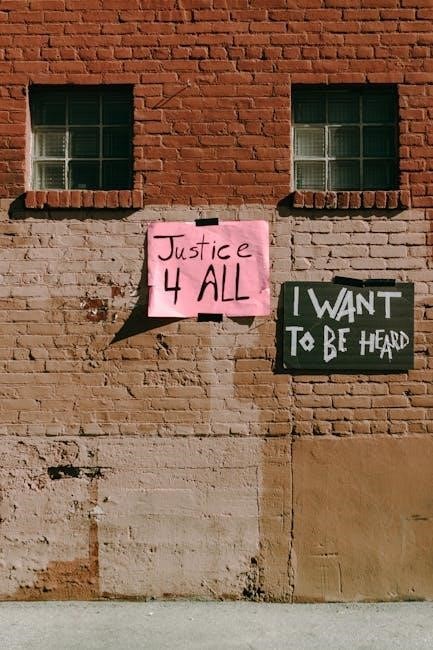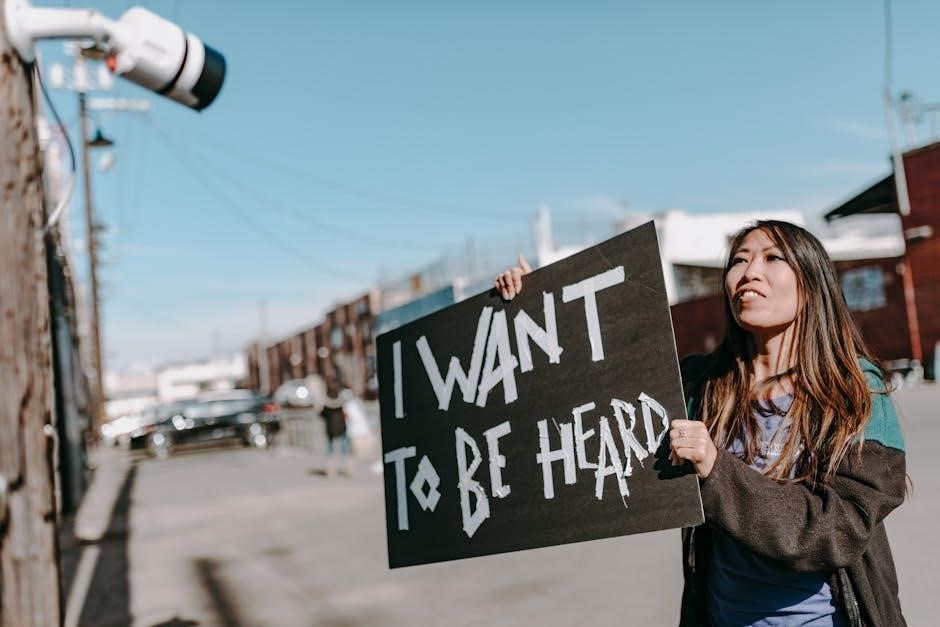rights police don’t want you to know pdf
Understanding your rights when interacting with police is crucial for ensuring fair treatment and preventing misunderstandings. Knowing these rights empowers individuals to protect themselves and understand their legal standing in various situations.
Why Understanding Your Rights Matters
Understanding your rights when interacting with police is essential for protecting yourself from injustice and ensuring fair treatment. Knowing your rights empowers you to make informed decisions, maintain dignity, and avoid unnecessary conflicts. Police interactions can be intimidating, but awareness of your legal protections fosters confidence and clarity. Whether you’re stopped, searched, or questioned, knowing your rights ensures you’re treated fairly and prevents potential abuses of authority. This knowledge is especially crucial for marginalized communities, who may face disproportionate targeting. By being informed, you can advocate for yourself and hold authorities accountable, promoting equality and justice in all encounters.

Key Rights When Interacting with Police
Awareness of your rights during police interactions is vital. Key rights include remaining silent, requesting a warrant, and knowing the reason for detention. Understanding these protections ensures fair treatment and accountability.
The Right to Remain Silent
The right to remain silent is a fundamental protection guaranteed by law. During police interactions, you are not obligated to provide information beyond basic identification. This right prevents self-incrimination and safeguards against coercive questioning. Exercising this right calmly and politely can protect you from unintended legal consequences. It is essential to understand that invoking this right does not imply guilt but rather a prudent step to ensure legal protections are maintained. Knowing this right empowers individuals to navigate interactions confidently, avoiding potential pitfalls that could arise from unintended statements. Always remain aware of this right to ensure your legal interests are preserved during any encounter with law enforcement.
The Right to Ask for a Warrant
When interacting with police, you have the right to ask for a warrant before allowing them to enter your home or conduct a search. Police generally cannot enter your property without your consent or a valid warrant signed by a judge. Knowing this right empowers you to protect your privacy and ensure legal procedures are followed. If officers claim to have a warrant, politely request to see it before granting access. This right is a crucial safeguard against unlawful searches and seizures. Exercising it can prevent unnecessary violations of your personal space and belongings. Always remember that asking for a warrant is a legitimate and lawful request to ensure your rights are respected.
The Right to Know Why You’re Being Stopped
When stopped by the police, you have the right to ask why you are being detained. Officers are required to provide a clear reason for the stop, whether it’s for a traffic violation, suspicious behavior, or other lawful reasons. Remaining calm and polite is essential during such interactions. You can ask, “Am I free to leave?” to clarify if you are being detained or if the interaction is voluntary. If not free to leave, you have the right to know the basis for the stop. This right ensures transparency and accountability, helping to prevent unlawful detentions. Knowing this empowers you to assert your rights confidently and seek further assistance if needed.

What Police Can and Cannot Do
Police can enter homes with a warrant or consent, use reasonable force, and conduct searches as per legal standards. They cannot enter without consent or a warrant.
Police Entry into Your Home
Police entry into your home is strictly regulated by law. Generally, officers need a valid warrant or your explicit consent to enter. Under the Fourth Amendment, unreasonable searches and seizures are prohibited. However, exceptions exist, such as in emergency situations where immediate action is necessary to prevent harm or destruction of evidence. If police arrive without a warrant, you have the right to deny entry unless they can demonstrate exigent circumstances. Always ask to see the warrant before allowing entry, as this ensures transparency and accountability. Knowing these boundaries helps protect your privacy and legal rights during such encounters.
Police Search and Seizure Laws
Police search and seizure laws are designed to protect individuals from unreasonable invasions of privacy. Under the Fourth Amendment, any search must be reasonable and typically requires a warrant. Officers may conduct a search without a warrant in specific circumstances, such as during an arrest or if evidence is in plain view. Probable cause is a critical standard, meaning police must have sufficient reason to believe a crime has occurred or evidence exists. If a search is conducted unlawfully, evidence obtained may be excluded from court proceedings. Understanding these laws ensures you know when to cooperate and when to assert your rights, protecting you from potential overreach by authorities.

Special Considerations for Minorities
Minorities, including racial, ethnic, and immigrant communities, often face unique challenges when interacting with police. Understanding your rights is crucial to navigating these situations effectively and safely.
Racial Profiling and Your Rights
Racial profiling remains a significant issue, with minorities often targeted disproportionately. Recognizing your rights helps combat this injustice. If stopped, remain calm and ask for the reason. You have the right to know why interactions occur. Documenting encounters ensures accountability. Knowing your rights empowers you to challenge unfair treatment. Stay informed and assertive to protect yourself legally and ethically. Understanding these rights is crucial for safeguarding personal freedoms and promoting equality within law enforcement interactions. Awareness is key to navigating such situations effectively and advocating for justice. Stay vigilant and informed to uphold your rights in all circumstances.
Immigration Status and Police Interactions
Your immigration status does not negate your rights during police interactions. Regardless of documentation, you have the right to remain silent and refuse entry without a warrant. Police cannot detain you solely based on immigration status without federal authority. Carry documentation if possible, but never lie. Request an attorney if questioned about immigration. Know that local police generally enforce state laws, not federal immigration policies. Stay calm, provide only necessary information, and understand your rights to avoid unlawful detention. Awareness of these rights ensures protection and fair treatment, even when interacting with law enforcement as an immigrant. Always seek legal advice if detained or questioned about your status. Knowledge is power in safeguarding your rights and ensuring justice.

How to Protect Your Rights
To protect your rights, document all police interactions, stay informed about your rights, seek legal advice promptly, and always carry identification. Awareness is key to safeguarding your rights.
Documenting Police Encounters

Documenting police encounters is a powerful way to protect your rights and ensure accountability; Always carry a smartphone to record interactions, as this can provide crucial evidence. If stopped, calmly inform the officer of your intention to record, as this can help de-escalate situations. Note the officer’s name, badge number, and the reason for the interaction. Keep the recording in a safe place and share it with legal counsel if needed. Documentation not only safeguards your rights but also promotes transparency and fairness in law enforcement practices. By being prepared, you can empower yourself and others to navigate such situations confidently and informed.

Filing Complaints Against Police Misconduct
Filing complaints against police misconduct is a critical step in holding law enforcement accountable and protecting your rights. If you believe you’ve been treated unfairly, document all details of the incident, including names, badge numbers, and witness contact information. Most departments have a formal complaint process, often handled by internal affairs or civilian review boards. You can submit complaints in writing or online, depending on local procedures. Seek legal advice to ensure your complaint is thorough and accurate. Organizations like the ACLU or local legal aid groups can provide guidance and support. Filing a complaint not only addresses your case but also helps prevent future misconduct, fostering a more just system for everyone.
Understanding your rights empowers you to protect them, fostering trust, accountability, and justice between communities and law enforcement, promoting fairness and safety for all.
Empowering Yourself with Knowledge
Empowering yourself with knowledge about your rights when interacting with police is essential for protecting your freedom and ensuring fair treatment. Understanding your legal rights allows you to make informed decisions during encounters with law enforcement. Knowing what police can and cannot do, such as the right to remain silent or the need for a warrant, can prevent misunderstandings and potential escalation. Education is a powerful tool that helps individuals assert their rights confidently and calmly. By staying informed, you not only protect yourself but also contribute to building trust and accountability between communities and law enforcement. Knowledge is key to navigating these situations effectively and advocating for your rights responsibly.

